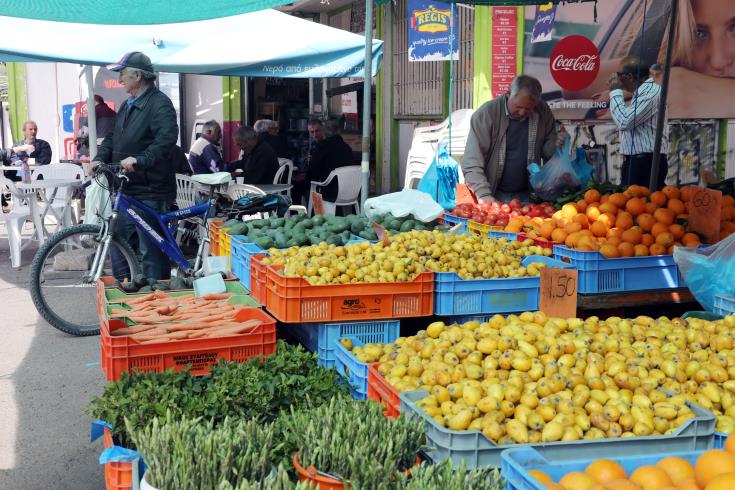Cyprus’ agriculture sector could not be left out of harm’s way, as the coronavirus crisis’ takes its toll on the country’s farmers, who are asking the state to step in to rescue them from disaster.
Cyprus farmers have seen the ripples of coronavirus crippling the tourist sector reaching them as they are unable to sell their products meant for hotels and restaurants.
Talking to the Financial Mirror, General Secretary of Panagrotikos Farmers Union, Tasos Yiapanis, said: “The complete loss of demand from restaurants and hotels has led farmers who were previously cooperating exclusively with catering companies, to start throwing their produce into the bin”.
He argued producers have also been hit by the blanket commercial flight ban, as there are virtually no planes flying fresh produce abroad. Fresh produce had been flown to markets abroad passenger planes.
The uncertainty that characterizes the coming months in terms of demand for agricultural products poses a huge risk to farmers, bringing some on the brink of disaster.
“We are now in the period when farmers are collecting their harvest, however, as the tourism sector is essentially non-existent there will be a sharp drop in demand.
Stock-breeders are also to be affected, as milk and meat demand has dropped.”
Nevertheless, top exports like halloumi and potatoes have not been adversely affected by the COVID-19 pandemic.
As Yapanis explained, farmers are losing out as they have already paid for their cultivation which was based on orders put in by suppliers of hotels and restaurants.
“These suppliers are now only buying one-tenth of orders placed earlier in the year”.
“Already farmers have started to dump fresh produce such as lettuce, cucumbers and eggplants in wastelands”.
Yiapanis welcoming the state’s measures to support farmers argued that the government will have to do more if it wants to see the sector survive.
“We need more than just the subsidies for the water we use”.
Yiapanis said that one of the things the government should subsidising is electricity used by farming,
He said growers are not able to find workers to work in their fields, as they rely heavily on seasonal foreign labour coming in from third countries.
These workers are not able to reach Cyprus due to the lockdown.
“The government should encourage Cypriots or other workers who are either temporarily out of work, or receive unemployment benefits, to come to the fields to work.”
He argued that the state could do this by allowing them to earn extra income while still receiving benefits.
Minister of Agriculture, Costas Kadis told the Financial Mirror that the authorities are aware of the tough conditions Cyprus farmers are working under as some exports have been hit by the pandemic.
“We know that problems have also arisen because of the closure of open-air markets as a result of the restriction of free movement decrees,” said Kadis.
To alleviate problems, Kadis said that the government is looking to introduce innovative measures.
“The Ministry of Agriculture is taking concrete measures…a coordinated effort is being made with the Undersecretary of Innovation to make products available through electronic platforms”.
Kadis noted that demand for pork and chicken has been dropping while beef and rabbit meat sales are stable.
“However, we know that our farmers are particularly concerned over a foreseeable drop in demand for goat and sheep meat which is usually in high demand during Easter.
But due to the social distancing demand for these products, along with eggs, will drop significantly,” said Kadis.
Kosher meat
Meanwhile, the Agriculture Ministry is aiming to help hundreds of farmers affected financially in the COVID-19 crisis by exporting kosher meat to Israel.
A relevant bill submitted by the Agriculture Ministry is to be discussed on Wednesday if passed it will allow slaughtering of animals in accordance with traditional Jewish practice (kosher).
Parliament is expected to approve the bill, amending the existing law to allow slaughtering of animals in accordance with traditional Jewish practice (kosher) opening up a new market for stockbreeders.
Kadis said the law amendment to allow kosher slaughter is a temporary measure aimed at offsetting the negative consequences of the coronavirus crisis on animal breeders.
“Our primary concern is to provide farmers with all possible assistance.”
“At the same time, we are called upon to find ways to facilitate the distribution of large quantities produced or already in the production process, so that there is no waste of food due to the unpredictable tourist season, suspension of catering operations and the restriction of exports,”
Kadis added that Cyprus is in regular contact with the relevant bodies of the European Commission.
The European Commission has drafted a bill to speed up the payment of various forms of subsidies to farmers, “which we intend to adopt by strengthening the financial flow of agricultural enterprises”.
Kadis also said that farmers will also receive a 20% discount for water used during from March to June.
Bills for these months will not be issued but will be split on bills for the following months of the year.
Meanwhile, farmers can further delay the payment of the relevant bills by another three months.
“Water supply will not under any circumstances be cut for the delay in payments,” he noted.
It was decided to speed up the return of VAT due to agricultural enterprises and the automatic renewal of licenses for workers of third countries employed in the agricultural sector.
“Compensation has been paid for damages suffered to certain types of crops due to extreme weather conditions. This exceeds by far the average compensation of the last 20 years, it was decided to pay the full amount, which reaches €11.2 mln,” said Kadis.
“At this point I would like to call on Cypriot consumers and food processors to support high quality Cypriot products, supporting in turn our farmers,” said Kadis.










